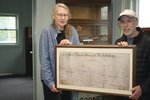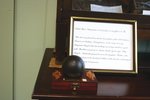


The Durham Historical Society now has a 5.6-pound cannonball with an interesting provenance. The cannonball was found “beneath the lowest floor of the Old Durham Furnace.” Described as “solid shot with a diameter of 3.18 inches,” it was cast at the Colonial Durham Furnace and is the gift of William Little Jr.
David Oleksa, president of the Durham Historical Society, said the projectile had been found by Benjamin Riegel in the early 1800s, and passed down through the Riegel family to the Littles. The Durham Grist Mill, centerpiece of the Village of Durham, was built in 1820 on the stone foundation of the original 1727 furnace.
The iron furnace in tiny Durham Township, little more than a frontier outpost in the early 1700s, was one of the first industrial sites in this country, and a small, dedicated group of volunteers means to ensure residents don’t forget that. The society works hard to preserve the town’s history, to spread the word and to continue its restoration of the Durham Grist Mill.
The original charcoal-burning furnace produced shot for the French and Indian War and for the American Revolutionary War.
Another gift recently presented by resident Les Williams was an iron fish-shaped mold for baking. This, though, was the product of a second iron furnace – one that used anthracite coal – built in the mid-19th century closer to the Delaware River. Another resident, Richard Thaler, presented the society a collection of 19th century mortgages, at least one as early as 1812.
The Little family also donated a handsome handmade wooden box containing two handmade nails. These new items join a collection of artifacts begun years ago.
“There was a lot going on around here,” said Oleksa, as he produced an early Sparkle Plenty soda bottle, explaining the beverage was bottled in the Village of Durham at some point. The company eventually moved to Bethlehem, he said, and disappeared into history.
There’s not much Oleksa and his wife, Lois, also a society director, don’t know about Durham’s past. They live in an early 19th-century stone home just outside the village. Stephen Willey, treasurer-director, also is a font of historical information.
The members are proud of the framed copy of a document hanging in the society office in the grist mill. Executed in 1737, it’s a patent for 101 acres in Durham with some mining rights granted by John, Thomas and Richard Penn, William Penn’s sons, to Jacob Trelly (of the Durham Iron Company) for 15 pounds, 13 shillings and one penny.
Willey noted this occurred just 10 years after the shameful Walking Purchase when the Penn sons cheated the Lenni Lenape out of thousands of acres. Durham was part of that land grab. The facsimile print was presented to the society by the Bucks County Commissioners in 2005. The mill is owned by the township.
The society members have their eye on the future as well as the past. Ongoing restoration of the mill includes turning one room into a museum with appropriate displays for the historical collection. New lighting is planned for the mill and the township supervisors recently agreed to pay $685 to extend the office WiFi system to the mill. That will not only provide more security for the structure but also make it available for speakers taking part in a series of educational workshops and lectures.
While its speakers program was canceled during the pandemic it will begin again at 2 p.m. Sunday, May 22, when Jeff Finegan, a Finesville, N.J., author, will present a seminar on George Washington. He has written several books on Washington.
Join our readers whose generous donations are making it possible for you to read our news coverage. Help keep local journalism alive and our community strong. Donate today.